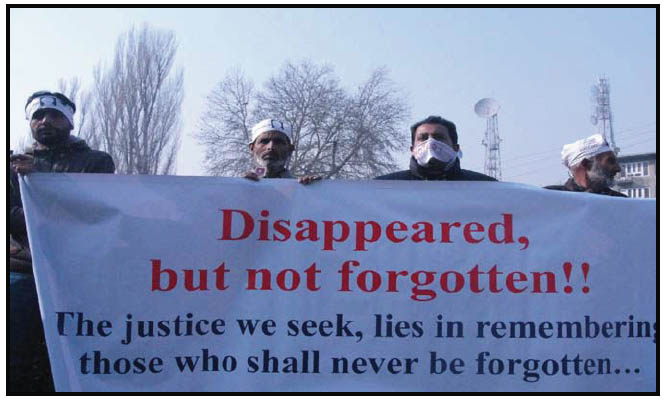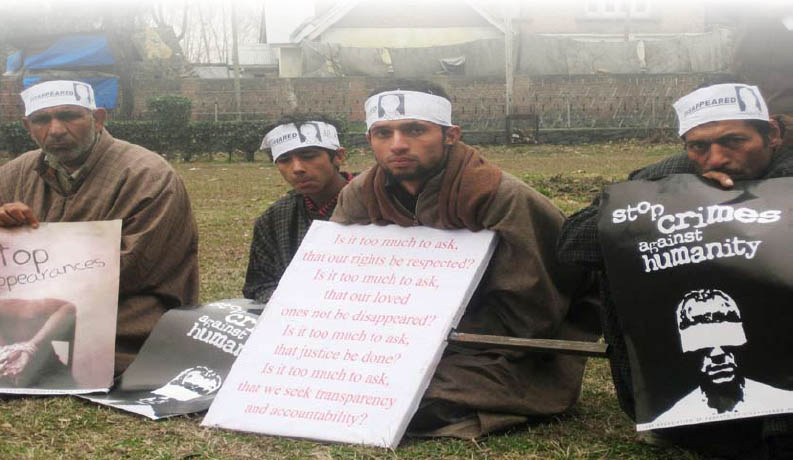Hiding Behind Lies
by Khurram Parvez

On 25 December 2010, while clearing the rubble of a damaged house in
Ladoo, Pampore in Pulwama district of Indian administered Jammu and
Kashmir, a group of laborers found a skeleton that was buried under the
debris. From the same spot, some clothes, an amulet and a black head
band were also recovered, which helped a local family to identify the
buried man. According to the family, the buried man was Mohammad Maqbool
Dar, who was abducted by unidentified gunmen in 1995 and since then, had
disappeared. Maqbool’s elder brother, Mohammad Yaseen Dar, a militant of
Al Umar Mujahideen was killed in an encounter in 1994. Due to Yaseen
Dar’s involvement in militancy, their house was raided quite regularly
and his family members were often harassed by the armed forces. 15 years
after the abduction of Maqbool, his remains have been surfaced despite
the efforts of the perpetrators to bury the evidence.
Mohammad Maqbool Dar is one among those thousands of victims who have
been subjected to enforced disappearance. There are very few cases like
Maqbool whose bodies have resurfaced in this manner after the
disappearance. In 2007, the exhumation of remains of 5 persons from
Ganderbal district led to the expose of a fake encounter. Recently, with
the exhumation of 3 boys in Macchil who were killed in a fake encounter
by the army, also the various cases in which after the court orders for
exhumations, it has been established that there is a link between those
subjected to enforced disappearances and those killed in fake encounters
and those buried secretly in unmarked graves.
The government of India and government of Jammu and Kashmir live in
denial mode. Each time, an exhumation like this comes as a reminder of
the demand for probing all the cases of disappearances in Jammu and
Kashmir and each time, it has been ignored or rejected by the
government. The truth about those disappeared is forcing itself to come
out and will not allow itself to be buried forever. Since 1989, more
than 8,000 people have been subjected to enforced disappearances.
Whether the discovery of the 2,943 bodies in the unmarked graves and
mass graves in north Kashmir or investigations into the cases of more
than 800 disappeared or the exhumations which have taken place over the
years, the concerns and demands of APDP for an impartial international
investigation are becoming emphatic and more significant.
On 2 December 2009, the International People’s Tribunal on Human Rights
and Justice in Indian administered Kashmir (IPTK), in collaboration with
APDP, released a report, ‘Buried Evidence’ about the presence of more
than 2,700 nameless and mass graves in the 55 villages of north Kashmir
in which there are 2,943 bodies.
The report was formally sent to the state government and the Chief
Minister Omar Abdullah acknowledged receiving the report. The State
Minister for Law and Parliamentary Affairs stated to the media that the
government would respond after reading the report. The matter was even
raised in the Indian Parliament by MP Mohammad Shafi Uri, to which the
Defense Ministry of India responded that it would study the report and
come up with a response. It has been more than a year since the report
on unmarked and mass graves in Indian administered Jammu and Kashmir was
submitted to the government but it seems that it has fallen to deaf
ears.
The government continues to exhibit its policy of callousness,
indifference and arrogance and is not allowing an independent and
impartial probe into all the cases of enforced disappearances and all
the unmarked graves.
The APDP had urged the Indian government to allow the International
Committee of the Red Cross (ICRC) to exercise its global mandate of
investigating the cases of disappearances and unmarked graves and mass
graves. The ICRC is professionally neutral and capable organization to
carry out an unbiased and thorough investigation into disappearances and
on the issue of unmarked graves. It is ironic that a democratic country
like India is afraid of transparency. An ICRC led probe or any
international investigation, in no way, will infringe on the sovereignty
of the Indian state. It certainly will help in establishing truth about
those disappeared and those buried in these unmarked graves. The Indian
state continues to suppress facts and thus, deny and delay the
information about those who have been cruelly subjected to enforced
disappearances.
India has signed the International Convention for the Protection for All
Persons from Enforced Disappearance but so far, has not ratified it.
Signing this Convention by any country is normally considered its
commitment against the phenomenon of enforced disappearances. In India’s
case, its commitment does not reflect at all in Jammu and Kashmir.
Neither does India acknowledge the phenomenon of enforced disappearances
in Jammu and Kashmir nor has it taken any measures to investigate into
the cases of enforced disappearances.
India is hiding behind lies, but truth cannot be always buried. Truth
shall overcome…


Khurram Parvez, an undaunted champion for peace, defends human rights in
war-torn Kashmir, encourages young people to pursue peaceful approaches
to change and advocates for families affected by the violence. While he
was a university student in Kashmir, Khurram witnessed the distress and
hostility of students accustomed to a lifetime of violence. He was a
recipient of the 2004 Reebok Human Rights Award. He works for the AFAD
as an alternate Council member representing the APDP.